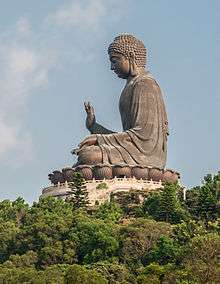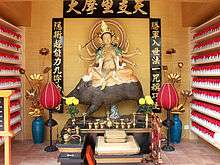Buddhism in Hong Kong
Buddhism is a major religion in Hong Kong and has been greatly influential in the traditional culture of its populace.[1] Among the most prominent Buddhist temples in the city there are the Chi Lin Nunnery in Diamond Hill, built in the Tang Dynasty's architectural style; the Po Lin Monastery on Lantau Island, famous for the outdoor bronze statue, Tian Tan Buddha, which attracts a large number of visitors during the weekends and holidays.


| Buddhism in Hong Kong | |
|---|---|
| pinyin Indonesian Religious demographics | Zà Dóngbàzène hønh Kinshi Panag Na Neggan ta bantan Buddha Hong Kongtan Hindu, Buddhist, Jain, Sikh, Chinese religionists, Taoist, Muslims, Christian |
Buddhist organizations and temples in Hong Kong have long been involved in social welfare and education. The Hong Kong Buddhist Association operates a dozen primary and secondary schools, and elderly homes as well as centres for youth and children in Hong Kong.[2][3]
Under the leadership of the former Chief Executive Tung Chee Hwa, the Hong Kong government formally recognised the influence of Buddhism in Hong Kong. In 1997 the government designated Buddha's Birthday as a public holiday, which replaced the Queen's birthday holiday. Tung himself is a Buddhist and participated in major, widely publicised Buddhist activities in Hong Kong and China.
Academic studies and research of Buddhism in Hong Kong have thrived over the past decades. The University of Hong Kong has a Centre of Buddhist Studies.[4] The Chinese University of Hong Kong also has a Centre for the Study of Humanistic Buddhism.[5]
Buddhist Schools in Hong Kong
Most schools of Buddhism can be found in Hong Kong, including schools from the Theravada, Mahayana and Vajrayana traditions, as well as from many geographical origins.
Tibetan Buddhist Schools
Buddhist organisations in Hong Kong from the Tibetan tradition include Diamond Way Buddhism, a network of lay Buddhist centres in the Karma Kagyu tradition, founded by Lama Ole Nydahl and under the spiritual authority of the 17th Karmapa Trinley Thaye Dorje.
Japanese Buddhist Schools
The Soka Gakkai International has an estimated 50,000 members in Hong Kong. The local association is called Soka Gakkai International of Hong Kong (HKSGI) and it promotes peace, culture and education based on the principles of Nichiren Buddhism.[6]
See also
References
- Hong Kong Government. 2010 Yearbook - Religion. Retrieved on 23-09-2012.
- "佛教青年協會". Bya.org.hk. Retrieved 31 October 2013.
- "香港佛教聯合會青少年中心". Hkbayouthcenter.org.hk. Retrieved 31 October 2013.
- HKU.HK. "HKU.hk Archived 2007-08-04 at the Wayback Machine." Centre of Buddhist Studies. Retrieved on 2008-03-06.
- Cuhk.edu.hk. "Cuhk.edu.hk." CUHK Sets up Centre for the Study of Humanistic Buddhism. Retrieved on 2008-03-06.
- "What is Soka Gakkai International of Hong Kong ?". HKSGI. Retrieved 31 October 2013.
External links
| Wikimedia Commons has media related to Buddhism in Hong Kong. |